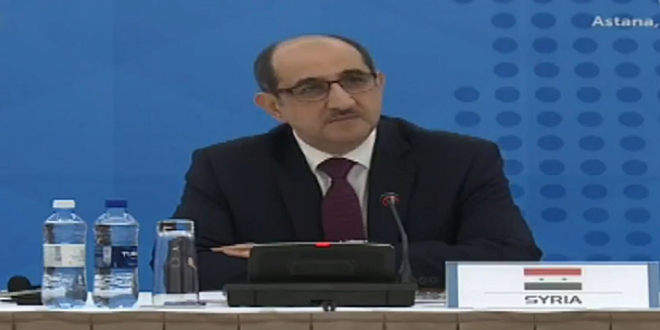Sabbagh: repeated Israeli attacks on Syrian territory aim to provide support to terrorist organizations

Astana, SANA- Head of the Syrian delegation to the 21st International Meeting on Syria under Astana format, Deputy Foreign and Expatriates Minister, Bassam Sabbagh has stressed the necessity of eliminating all terrorist organizations, ending illegal foreign military presence on Syrian territory, and committing to respecting Syria’s sovereignty, unity, and territorial integrity.
During a press conference at the conclusion of the meeting, Sabbagh said that the return of Syrian refugees to their homeland is a priority for Syria, and work is being done with the United Nations to provide the necessary facilitations for this return.
He underlined the necessity of immediately and unconditionally lifting the unilateral coercive measures imposed by the US and the European Union on the Syrian people.
Sabbagh noted that the repeated Israeli attacks on Syrian territory aim to provide support and assistance to terrorist organizations to maintain the state of instability in Syria.
Sabbagh pointed out that the delegation met with the UN Deputy Special Envoy of the Secretary-General to Syria.
Talks during the meeting dealt with issues related to the work and authority of the Special Envoy, as well as stressing on the importance of the Astana process and the results it achieved on several levels, and that there is a need to achieve more, especially with regard to eliminating terrorist organizations and ending the illegal US and Turkish foreign military presence on Syrian territory.
The delegation stressed that this path aims primarily to affirm respect for Syria’s sovereignty, independence, unity and territorial integrity, and to effectively implement the outcomes of Astana.
Sabbagh noted that the delegation presented the efforts made by Syria in terms of consolidating security and stability by expanding the scope of national reconciliations, settling the conditions of citizens, issuing successive amnesty decrees, securing the flow of humanitarian aid in cooperation with the UN and relevant international organizations, focusing on building the resilience of Syrians, and strengthening and expanding early recovery projects.
In this regard, Syria extended the permission it granted to the United Nations to use the Bab al-Hawa border crossing to deliver humanitarian aid to Syrian civilians in northwestern Syria for an extra six months, as well as to extending work at Bab al-Salama and al-Rai crossings for three months to deliver humanitarian aid to the areas affected by the earthquake that occurred last February, Sabbagh stated.
Regarding the issue of the return of refugees, Sabbagh stressed that this return represents a main goal for Syria, and work is being done in cooperation and coordination with the United Nations High Commissioner for Refugees (UNHCR) to provide the appropriate conditions and facilities necessary to secure a descent return of refugees and displaced persons to their areas, as well as many steps have been taken in order to facilitate this return and the efforts are continuing to achieve this goal.
In a related context, the need to immediately and unconditionally lift the unilateral coercive measures imposed by the US and the EU on the Syrian people was stressed due to their disastrous effects on various aspects of their daily lives, Sabbagh stressed.
In response to a question about the return of relations between Syria and Turkey, Sabbagh said: We stressed during the past meetings and we repeat it again today that the withdrawal of Turkish forces present illegally on Syrian territory is a basic condition for the return of these relations, as relations cannot return to normal in light of Turkey’s continued violation of the sovereignty of Syrian territory and this matter must be clear to everyone.





